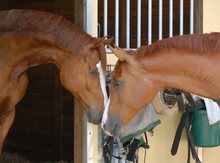With summer just around the corner, many horse owners are getting ready to enjoy the prime time of summer fairs, shows, and trail riding. Along with the increased activity and travel with horses comes an increased threat of equine infectious disease, especially infectious upper respiratory diseases such as equine influenza, equine herpesvirus (rhino) and strangles.

Tip #4 - No nose-to-nose touching by horses
With summer just around the corner, increased activity and travel brings exposure to equine upper respiratory diseases such as equine influenza, equine herpesvirus and strangles.
As horse owners, following good biosecurity practices is one of the most important things that can prevent horses from catching contagious diseases.
The goal with biosecurity is to reduce the chance that viruses, bacteria, or other germs will be carried to or from your property or transmitted from >horse to horse within your property.M/p>
Other horses, people, insects, trailers, and equipment can all carry germs and diseases from one place to another. By making good biosecurity a habit on the road and at home, youâll help keep your horses healthy.
The key component to an infectious disease control program is a good vaccination protocol developed by you and your veterinarian. However, it must be recognized that vaccination programs will not succeed without appropriate management practices. Here are some tips to decrease the chances of your horse getting sick from an infectious or contagious disease while traveling:
- Start with a good vaccination program developed by you and your veterinarian.
- Whenever possible use your own trailer and avoid shipping with horses from other farms. Make sure the trailer is clean and well-ventilated.
- Avoid hauling long distances.
- Donât let your horse touch other horses, especially nose-to-nose.
- Avoid using community water tanks and donât share equipment (water buckets, feed pans, brushes, etc.)
- Spray or disinfect stalls at show grounds prior to putting your horse in the stall.
- Wash your hands after handling other horses and before handling your own horse.
Horse owners can enhance their horseâs response to vaccination, enhance the efficacy of the vaccines used and better protect their horses against infectious and contagious diseases by applying intelligent and appropriate management strategies while they are on the road this summer.
